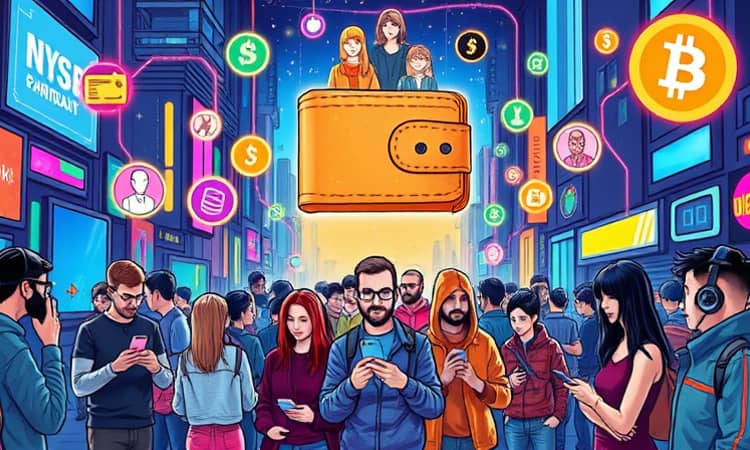In today’s fast-paced digital landscape, our smartphones serve as lifelines to work, social life, and increasingly, our finances. A digital wallet is no longer just a virtual substitute for cash or cards; it has evolved into a versatile financial hub that empowers users to manage money, identity, and even assets in one place. This comprehensive article explores how digital wallets are reshaping personal finance and what users can do to harness their full potential.
The Rise of the Digital Wallet
The global digital wallet market is on an explosive trajectory, with projections estimating a value of $56.92 billion by 2025 and soaring to $119 billion by 2029. Another analysis pegs the mobile wallet segment at $12.85 billion in 2025, expected to exceed $104 billion by 2034. These numbers illustrate a compound annual growth rate of over 20% in some segments and up to 26.3% in others, reflecting diverse methodologies and user segments across regions.
By 2025, an astounding five billion people — more than half the world’s population — are expected to use digital wallets. This marks a leap from the 3.9 billion users recorded in 2023, underscoring rapid adoption fuelled by smartphone affordability, widespread internet access, and supportive fintech policies enacted by governments worldwide.
This widespread uptake shows how digital wallets have transcended payment utilities to become essential tools for everyday life across the globe.
Beyond Payments: Unlocking New Functionalities
Modern digital wallets are packed with features that address a spectrum of financial and non-financial needs. They facilitate seamless peer-to-peer transfers and cross-border remittances, offer multi-currency support including cryptocurrencies, and simplify recurring expenses like utility bills and mobile recharges. Users can also store boarding passes, loyalty cards, and digital IDs, reducing the need for physical documents.
- Contactless payments via NFC and QR codes at retail outlets
- Bill payments and recharges for utilities and digital services
- Programmable payouts for payroll, rewards, and automated disbursements
- Decentralized finance (DeFi) and Web3 asset management
- Ticketing and reservations for travel, movies, and events
These capabilities transform a digital wallet into an all-in-one platform, tailored to the modern user’s busy lifestyle and diverse transactions.
Security and Trust: The Foundation of Adoption
Despite the convenience, 93% of potential users cite hacking and fraud fears as their primary concern. To address these challenges, digital wallets deploy cutting-edge biometric security measures such as fingerprint and facial recognition, alongside tokenization and end-to-end encryption. Multi-factor authentication further safeguards access, ensuring that only authorized individuals can complete transactions.
Emerging integrations with blockchain technology and decentralized identity frameworks promise enhanced privacy and data sovereignty, granting users control over their personal information. As regulations evolve, clear guidelines will bolster user confidence and foster even greater adoption.
Emerging Trends Shaping the Future
Innovation continues at a rapid pace, with digital wallets poised to play central roles beyond conventional finance. The rise of central bank digital currencies (CBDCs) will integrate state-backed money into private wallets, offering a seamless bridge between traditional and digital economies. Meanwhile, wallets are becoming gateways to the metaverse, enabling users to transact and verify their identities in virtual environments.
- AI-driven insights for budgeting, spending analysis, and personalized recommendations
- Integration with Internet of Things devices for payments via wearables and smart appliances
- Financial inclusion initiatives to bring banking services to unbanked populations
- Sustainability and social impact through transparent aid distribution and reduced paper waste
For businesses, open APIs and partnerships between fintechs, banks, and merchants are unlocking new revenue streams and customer engagement models.
Overcoming Barriers: Building Confidence and Access
To dismantle adoption hurdles, digital wallet providers must prioritize intuitive interfaces and universal acceptance. Simplifying onboarding processes, offering multilingual support, and ensuring offline transaction capabilities can dramatically expand reach, especially in developing regions. Providers should also foster transparency around data usage and security practices to address privacy concerns.
Regulatory harmonization across borders will be key to supporting cross-country transactions and AML compliance. Strategic collaboration between governments, financial institutions, and technology firms can create an ecosystem that nurtures trust and accelerates innovation.
Embracing the Opportunity: Practical Steps for Users and Businesses
For individual users, choosing a digital wallet means evaluating security credentials, feature sets, and global acceptance. Start by enabling biometric locks, regularly updating the app, and taking advantage of in-app budgeting tools. Explore cross-border remittance options to reduce fees, and link loyalty programs to maximize rewards.
Businesses can integrate wallet payments at checkout, leverage API-driven loyalty campaigns, and explore programmable reward structures to enhance customer retention. Corporate treasuries can adopt digital wallets for efficient payroll, expense management, and global supplier payments, unlocking real-time visibility and cost savings.
As we look ahead, the digital wallet stands poised to become an indispensable companion in both our physical and virtual lives. Whether you’re paying for coffee, managing investments, or stepping into a virtual realm, your digital wallet will adapt to your needs. Embrace these tools today to unlock a more connected, efficient, and inclusive financial future.














